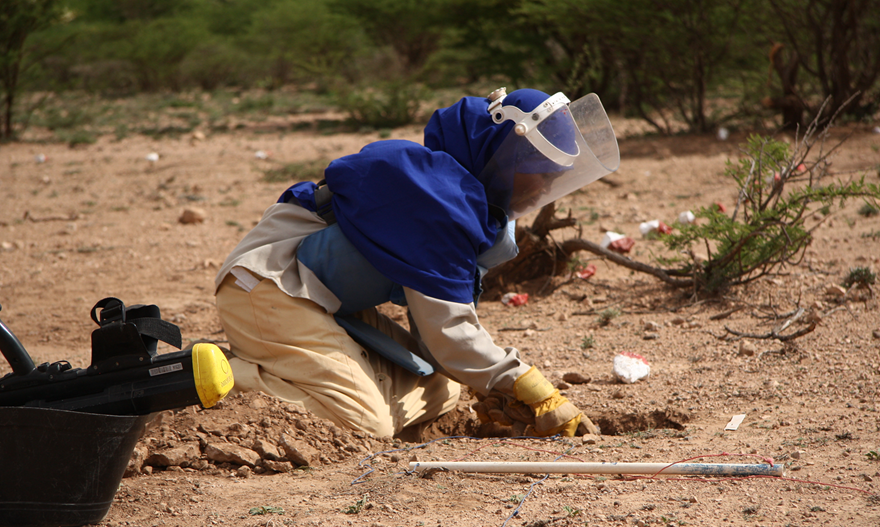UK announces additional £3m to clear mines in Somalia and five other nations


By Fauxile Kibet
The UK has pledged an addition £3 million to facilitate demining activities in five countries among them Somalia with the goal of saving 50,000 people from the risk of landmines.
International Development Strategy Secretary Penny Mordaunt in a statement to mark the World International Mine Awareness Day said the funds which are in addition to last year’s £100 million will support demining in Somalia, South Sudan, Zimbabwe, Burma and Colombia.
The UK minister warned that in far too many countries, children risk their lives every day to go to school or play with friends because years of devastating wars have left land littered with lethal, hidden mines.
According to the latest figures, 2016 saw more child casualties than ever before and the highest number of total fatalities on record for more than 15 years. More than 8,600 people were injured and more than 2,000 people were killed during the year by landmines and other explosive devices left behind by conflict.
In Somalia, 75% of deaths and injuries caused by unexploded ordnance in 2017 were among children.
“From today, UK aid will help save the lives of 50,000 more people in South Sudan, Somalia, Zimbabwe, Burma and Cambodia by clearing mines from over five million square metres of land – the equivalent of over 19,000 tennis courts – and through educating vulnerable people about the dangers of landmines, keeping entire communities safe from maiming or death,” she said.
Last year, the Department for International Development (DFID) made a £100 million commitment to make 15 million square metres of land safe again over a three year period.
Years of war has ranked Somalia as one of the countries with a high risk of land mines – blamed for several deaths yearly. In 2012, Somalia signed the Anit-Personnel Mine Ban convention which meant that the country undertook to “never under any circumstances, use, produce or transfer anti-personnel mines”.
Somalia also by signing the convention agreed to assist the landmine survivors, to destroy its existing stockpile of mines within the next four years and to demine its territory. With Somalia’s accession, every state in Sub-Saharan Africa was bound by this convention.
Somalia’s decision to join the treaty was agreed to unanimously by the Council of Ministers on 5th April 2012. Somalia then deposited its instrument of accession on 9 April, noting that it would “undertake faithfully to perform and carry out the stipulations contained” in the Convention.
DENSEST LANDMINES
Zimbabwe has also been identified as among the countries that require urgent action to reduce live loses due to mines.
The South African country according to Halo Trust, a United Kingdom based demining organisation has approximately 5,500 unexploded landmines per kilometre, making it one of the densest minefields in the world.
The organization says that most of the deadly explosives were planted by the colonial Rhodesian Army at the peak of the liberation struggle along Zimbabwe’s northern and eastern borders to prevent anti-colonial soldiers from entering the country from Mozambique and Zambia.
Landmines on Zimbabwe’s northeast border with Mozambique reportedly cover an area of 335km. “Zimbabwe has one of the densest minefields in the world, with about 5,500 landmines per kilometre,” adds the Halo Trust.
In South Sudan, some 6 million people live in areas with the presence of landmines and explosive remnants of war, according to the United Nations Mine Action Centre (UNMAS).
The agency says that an estimated over to 90 million square kilometers of land have been identified as containing explosive hazards. These hazards have greatly hampered the delivery of humanitarian aid and hinder socioeconomic development in the world’s youngest nation.
“In addition to the threats posed to the safety of conflict-affected communities, explosive hazards prevent the safe movement of the population including those who must flee active conflict,” UNMAS said in a statement.
The latest move by the United Kingdom to help in demining these areas will greatly assist in reducing hazards faced by the affected countries’ citizens.